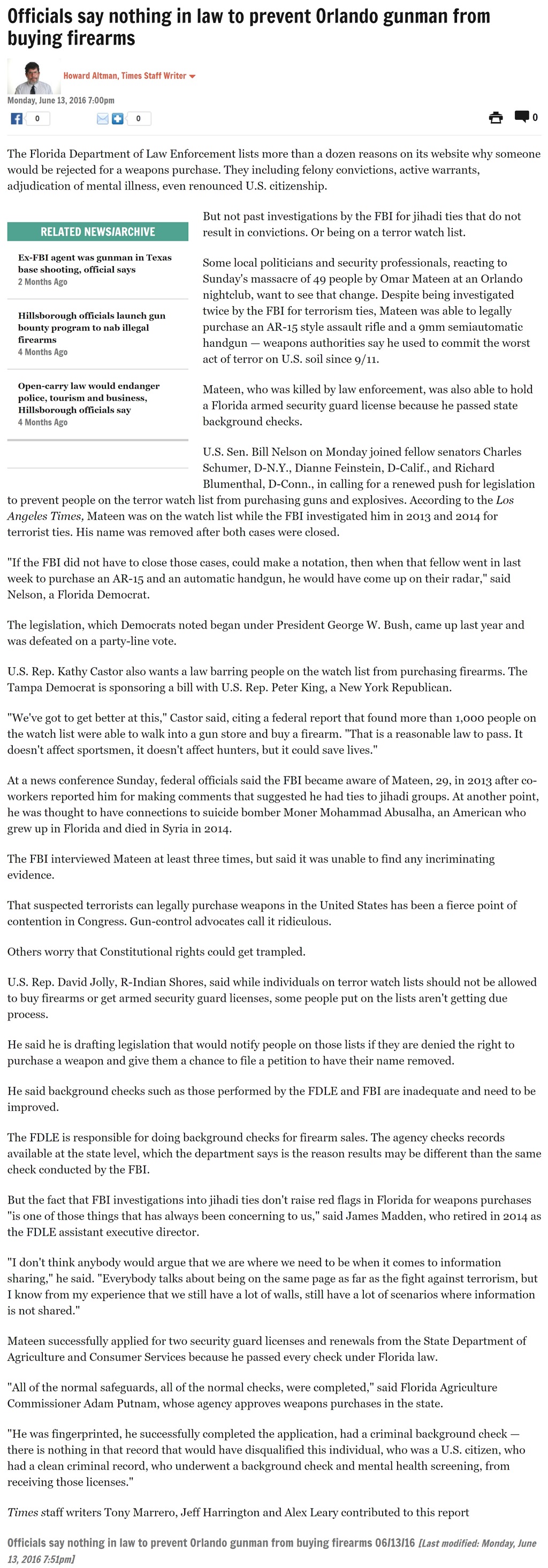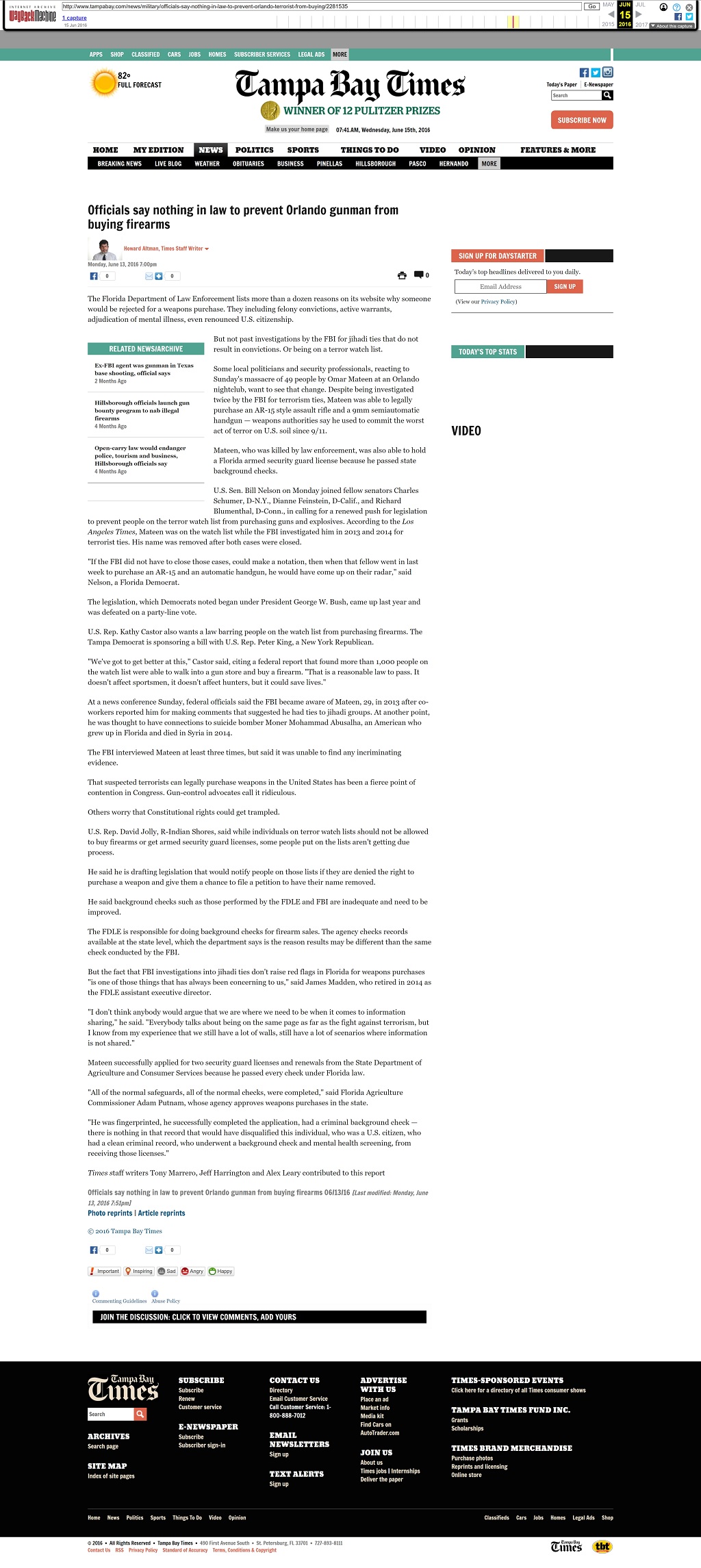
News / Public Safety
By Howard Altman / Tampa Bay Times / June 13, 2016
The Florida Department of Law Enforcement lists more than a dozen reasons on its website why someone would be rejected for a weapons purchase. They including felony convictions, active warrants, adjudication of mental illness, even renounced U.S. citizenship.
But not past investigations by the FBI for jihadi ties that do not result in convictions. Or being on a terror watch list.
Some local politicians and security professionals, reacting to Sunday’s massacre of 49 people by Omar Mateen at an Orlando nightclub, want to see that change. Despite being investigated twice by the FBI for terrorism ties, Mateen was able to legally purchase an AR-15 style assault rifle and a 9mm semiautomatic handgun — weapons authorities say he used to commit the worst act of terror on U.S. soil since 9/11.
Mateen, who was killed by law enforcement, was also able to hold a Florida armed security guard license because he passed state background checks.
U.S. Sen. Bill Nelson on Monday joined fellow senators Charles Schumer, D-N.Y., Dianne Feinstein, D-Calif., and Richard Blumenthal, D-Conn., in calling for a renewed push for legislation to prevent people on the terror watch list from purchasing guns and explosives. According to the Los Angeles Times, Mateen was on the watch list while the FBI investigated him in 2013 and 2014 for terrorist ties. His name was removed after both cases were closed.
“If the FBI did not have to close those cases, could make a notation, then when that fellow went in last week to purchase an AR-15 and an automatic handgun, he would have come up on their radar,” said Nelson, a Florida Democrat.
The legislation, which Democrats noted began under President George W. Bush, came up last year and was defeated on a party-line vote.
U.S. Rep. Kathy Castor also wants a law barring people on the watch list from purchasing firearms. The Tampa Democrat is sponsoring a bill with U.S. Rep. Peter King, a New York Republican.
“We’ve got to get better at this,” Castor said, citing a federal report that found more than 1,000 people on the watch list were able to walk into a gun store and buy a firearm. “That is a reasonable law to pass. It doesn’t affect sportsmen, it doesn’t affect hunters, but it could save lives.”
At a news conference Sunday, federal officials said the FBI became aware of Mateen, 29, in 2013 after co-workers reported him for making comments that suggested he had ties to jihadi groups. At another point, he was thought to have connections to suicide bomber Moner Mohammad Abusalha, an American who grew up in Florida and died in Syria in 2014.
The FBI interviewed Mateen at least three times, but said it was unable to find any incriminating evidence.
That suspected terrorists can legally purchase weapons in the United States has been a fierce point of contention in Congress. Gun-control advocates call it ridiculous.
Others worry that Constitutional rights could get trampled.
U.S. Rep. David Jolly, R-Indian Shores, said while individuals on terror watch lists should not be allowed to buy firearms or get armed security guard licenses, some people put on the lists aren’t getting due process.
He said he is drafting legislation that would notify people on those lists if they are denied the right to purchase a weapon and give them a chance to file a petition to have their name removed.
He said background checks such as those performed by the FDLE and FBI are inadequate and need to be improved.
The FDLE is responsible for doing background checks for firearm sales. The agency checks records available at the state level, which the department says is the reason results may be different than the same check conducted by the FBI.
But the fact that FBI investigations into jihadi ties don’t raise red flags in Florida for weapons purchases “is one of those things that has always been concerning to us,” said James Madden, who retired in 2014 as the FDLE assistant executive director.
“I don’t think anybody would argue that we are where we need to be when it comes to information sharing,” he said. “Everybody talks about being on the same page as far as the fight against terrorism, but I know from my experience that we still have a lot of walls, still have a lot of scenarios where information is not shared.”
Mateen successfully applied for two security guard licenses and renewals from the State Department of Agriculture and Consumer Services because he passed every check under Florida law.
“All of the normal safeguards, all of the normal checks, were completed,” said Florida Agriculture Commissioner Adam Putnam, whose agency approves weapons purchases in the state.
“He was fingerprinted, he successfully completed the application, had a criminal background check — there is nothing in that record that would have disqualified this individual, who was a U.S. citizen, who had a clean criminal record, who underwent a background check and mental health screening, from receiving those licenses.”
Times staff writers Tony Marrero, Jeff Harrington and Alex Leary contributed to this report
Wayback image

